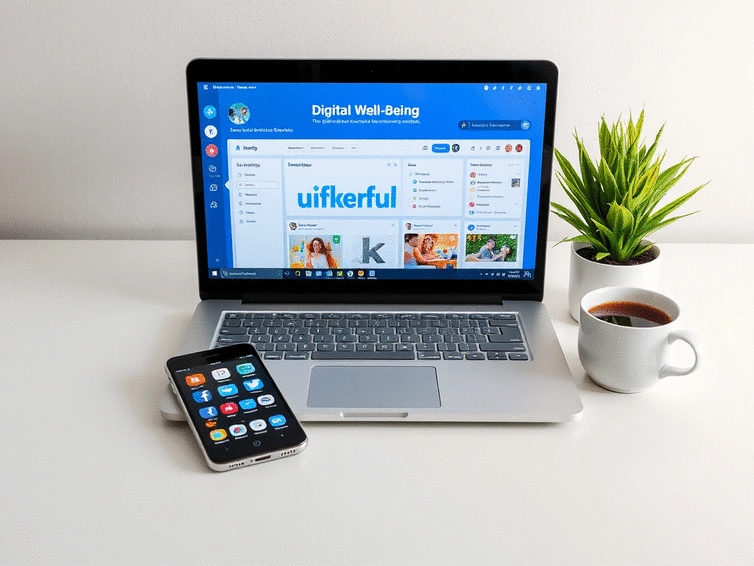Empowerment Through Awareness
Understanding online behaviors empowers healthier choices, leading to better mental and emotional outcomes.

In a world increasingly dominated by social media, understanding digital well-being is more crucial than ever. How can we ensure our online interactions enrich our lives rather than detract from them? Here, we explore key insights that can empower you to foster healthier relationships in the digital realm.
Digital well-being is vital for a healthy online experience. It involves understanding and managing the impact of digital activities on mental and emotional health. Below are three core elements that contribute to fostering digital well-being.
In our rapidly evolving digital world, the concept of digital well-being has become essential. It encompasses how we navigate our online lives while maintaining a healthy relationship with technology. Digital well-being is about finding balance—ensuring that our interactions on social media and other platforms enhance our lives rather than detract from them. This is particularly significant as social media becomes more intertwined with our daily routines.
At Likers Network, we believe understanding digital well-being is crucial for everyone, whether you’re a casual user or a professional engaging with audiences. By prioritizing well-being, we can foster healthier online communities that value connection over competition.

So, what does digital well-being really mean? In simple terms, it refers to the overall impact that our digital activities, particularly on social media, have on our mental and emotional health. It’s important because it shapes our interactions and influences how we view ourselves and others. Without a keen awareness of our digital habits, we might find ourselves engaging in behaviors that adversely affect our well-being.
As we dive deeper into this topic, let’s examine the role social media plays in our lives today.
Social media has transformed how we communicate, share, and connect. Platforms like Facebook, Instagram, and X (formerly Twitter) have become integral to our daily experiences. They allow us to share our lives, but they can also create a pressure to conform to idealized standards. This duality is what makes social media both a blessing and a challenge.
Reflect on your own experiences: how often do you find yourself scrolling through your feed? It’s easy to get lost in the endless stream of content, which can lead to feelings of inadequacy or anxiety. Recognizing this pattern is the first step toward achieving a healthier relationship with social media. Research from the National Telecommunications and Information Administration (NTIA), for instance, highlights the growing concerns about online safety and its implications for user well-being, especially among younger demographics.
Digital literacy is another key element of digital well-being. It refers to our ability to effectively navigate the digital landscape. This includes understanding how to critically assess information and engage responsibly online. When we are digitally literate, we can better protect our mental health and foster positive online interactions.
By enhancing our digital literacy, we take significant strides toward improving our overall digital well-being. At Likers Network, we are committed to providing resources that help individuals develop these essential skills. A study published in PMC (PubMed Central) underscores the importance of digital literacy in mitigating the negative impacts of social media on mental health.
How do you ensure your digital well-being while navigating social media? Share your strategies or challenges below:
At Likers Network, we believe that digital well-being goes beyond individual experiences; it encompasses community and culture as well. This interconnectedness is vital as we navigate our online lives. The relationships we build in digital spaces can significantly impact our well-being and shape our understanding of social media's role in our lives.
As we foster connection and advocacy in digital spaces, it’s essential to recognize that our online communities can either uplift us or contribute to our challenges. By being intentional about the communities we engage with, we can create a healthier and more supportive environment for ourselves and others.

Engaging authentically in our online communities means promoting mental wellness and advocating for healthy social media practices. Here are some ways to foster positive connections:
By actively participating in these discussions, we can advocate for better practices within our circles, ultimately enhancing our collective digital well-being.
One size does not fit all when it comes to digital well-being. Different demographics experience social media in unique ways, so it’s crucial to tailor our approach. For instance, younger users may face different challenges than older generations. Here are some tailored strategies:
Addressing these diverse needs can lead to more effective solutions that resonate with various audiences. Remember, at Likers Network, we aim to empower everyone to navigate their digital lives with confidence! The Stanford University Center for Digital Health emphasizes the need for tailored strategies for youth safety and digital well-being, highlighting the varied experiences across age groups.
Digital citizenship is a crucial concept that emphasizes the responsible use of technology. As members of online communities, we all have a role to play in promoting positive behaviors. Here’s what being a good digital citizen looks like:
By adopting these principles, we contribute to healthier online environments that prioritize well-being and inclusivity. Together, we can create a culture of respect and compassion in our digital spaces.
Digital well-being refers to the overall impact that our digital activities, especially on social media, have on our mental and emotional health. It's about maintaining a healthy balance with technology so that it enhances, rather than detracts from, our quality of life.
Social media is deeply integrated into modern life, influencing our communication and connections. Prioritizing digital well-being helps individuals make healthier choices, foster meaningful connections, and develop awareness of the psychological impacts of social media, preventing potential negative effects like anxiety or feelings of inadequacy.
Digital literacy is crucial for navigating the online world effectively. It involves the ability to critically assess information, understand privacy settings, and engage respectfully online. Being digitally literate helps protect mental health and promotes positive online interactions by reducing exposure to misinformation and harmful content.
Communities can foster digital well-being by encouraging open discussions about mental health and digital habits, sharing resources that promote healthy technology use, and creating supportive groups. Advocating for better online practices and promoting respectful engagement also contributes to a healthier collective digital environment.
Digital citizenship is the responsible and ethical use of technology. It involves respecting others' privacy, being mindful of the impact of one's online actions, and reporting harmful content. Practicing good digital citizenship helps create more inclusive, respectful, and safer online communities for everyone.
Here is a quick recap of the important points discussed in the article:
Convert Followers into Customers

What if your influencer marketing strategy could transform not just your sales, but the very percept
Join Niche Communities to Grow Audience

What if mastering the art of engaging with niche communities could be the key to unlocking your bran
Social Media Trends for Engagement

In today's fast-paced digital world, social media trends evolve at lightning speed. Marketers who ha
Convert Followers into Customers
Join Niche Communities to Grow Audience
Social Media Trends for Engagement
Staying Relevant in Digital Culture
Measuring Social Media Effectiveness